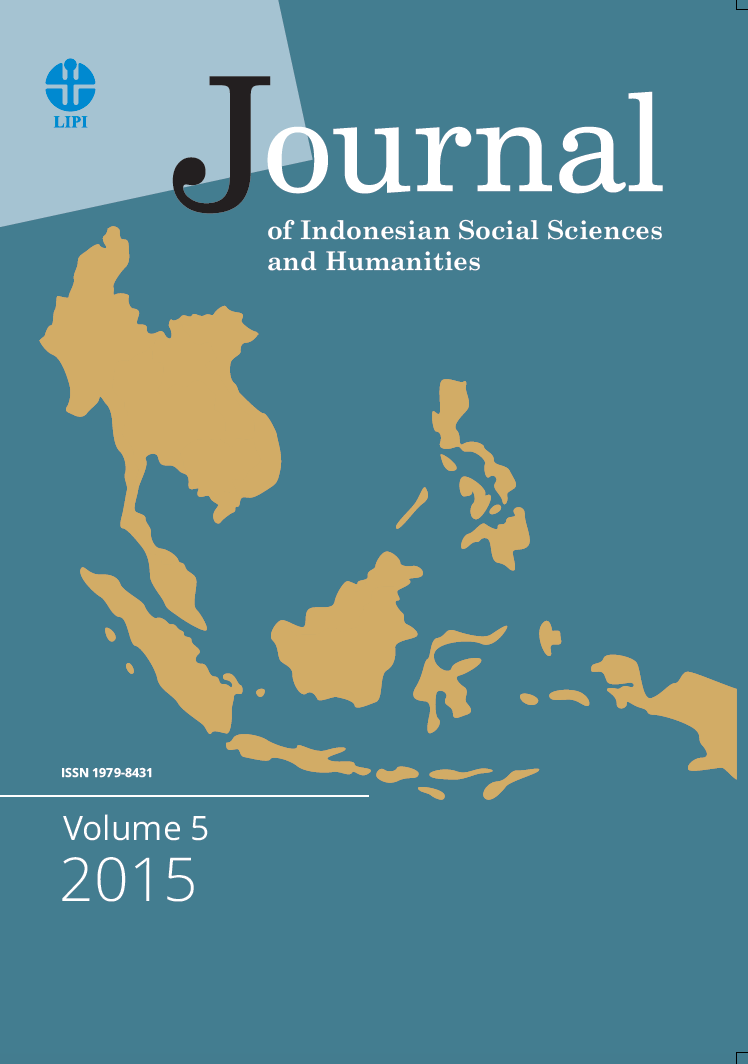Breaking The Silence: Articulating the Memories of the Tanjung Priok Victims
Keywords:
victims and their families, Tanjung Priok, Post-Suharto regime, sites of memoryAbstract
For the victims of atrocities, the past is not the past: it remains a trauma. The more they try to forget, the more entrenched their memories become. Hence, memory is a means for sustaining their quest for justice—a way victims and their advocates can keep faith in their pursuit of truth, accountability and legal restitution. Unlike the situation during the Suharto presidency when the Indonesian people were silenced, this paper is now able to examine the memories, now articulated, of the people affected by the Tanjung Priok tragedy, which have appeared since Suharto’s fall. This gives momentum to a new phase of political development in which Indonesians, particularly the victims of violence, may break their silence to pursue justice. The following questions need to be asked: what are the circumstances that have encouraged the victims to articulate their memories in the 17 years since Suharto’s departure? In what way have they kept their memories fresh? This paper argues that the main reason they articulate their memory is because of the traumas that always haunted them during the Suharto presidency. The trauma and injustices experienced; the torture, gaol, and the stigma attached to them by the Suharto regime’s propaganda, all ensured that the general Indonesian social memory of the events at Tanjung Priok was false and distorted. But those sites of memory, the rites, monuments, and memoirs served to strengthen the articulation of those memories to enable some redress after Suharto regime had ended.
References
Amstutz, MR. (2005). The healing of nations: the promise and limits of political forgiveness. Lanham: Rowman and Littlefield.
Biki, Abd. Rusly & Yasin, R. (2005). Menuju kedamaian nan indah : merajut pesan sejarah perjuangan alm. H. Mohammad Amir Biki : menelusuri sejarah berdarah Tanjung Priok, peristiwa 12 September 1984. Jakarta: Yayasan Al-A’raf.
Budiawan. (2005). ‘Komunis(me) tidak pernah mati?’ Bulletin nadheer, published by the postgraduate of Religious and Cultural Studies, Sanata Dharma University, 4(4): 4.
Climo, Jacob J and Maria G Cattell (eds). Social memory and history: anthropological perspectives. Walnut Creek: AltaMira Press, 2002.
Fatwa, AM. (1999). Dari mimbar ke penjara: suara nurani pencari keadilan dan kebebasan. Bandung: Mizan.
Goffman, Erving. (1963). Stigma, notes on the management of spoiled identity, New York: Touchstone.
Hardiman, F Budi. (2005). Memahami negativitas, diskursus tentang massa teror, dan trauma. Jakarta: Kompas.
Heryanto, Ariel. (2007). State terrorism and political identity in Indonesia: fatally belonging. London and New York: Routledge.
Maloko, Moch. Syarifin. (2001). Pancasila, de Islamisasi dan politik provokasi: Sebuah pledoi. Yogyakarta : Poestaka Bersatoe.
McGregor, Katharine E. (2007). History in uniform: military ideology and the construction of Indonesia’s past. Honolulu: University of Hawaii Press.
Pramuko, Yudi. (1999). Pembantaian Tanjung Priok rabu 12 September 1984. Jakarta: Dokumentasi Umat Islam Terpadu (DUIT).
Pusat Studi dan Pengembangan Informasi (1998) Tanjung Priok berdarah: tanggung jawab siapa. Jakarta: Gema Insani Press.
Roosa, John, Ayu Ratih and Hilmar Farid (eds). (2004). ‘Sejarah lisan dan ingatan sosial’. Tahun yang tak pernah berakhir: memahami pengalaman korban 65, Jakarta: Elsam, Tim Relawan with Kemanusiaan, and Institut Sejarah Sosial Indonesia.
Santikarma, Degung. (2005). ‘The politics of representing violence in Bali’. In Mary S Zurbuchen (ed.). Beginning to remember, the past in the Indonesian present. Seattle: University of Washington Press, p. 319.
Schreiner, Klaus H. (2005). ‘Lubang buaya: histories of trauma and sites of memory’. In Mary S Zurbuchen (ed.). Beginning to remember, the past in the Indonesian present, Seattle: University of Washington Press.
Subhan S.D. & Gunawan, FX Rudy (eds.) (2004). Mereka bilang di sini tidak ada Tuhan, suara korban Tragedi Priok. Jakarta: Kontras and Gagas Media.
Sunardi. (2006). ‘Lacanian subject’. Unpulished paper in the Postgraduate School of Religious and Culture Studies, Sanata Dharma University, Yogyakarta.
Zurbuchen, Mary S. (ed.). (2005). Beginning to remember, the past in the Indonesian present. Seattle: University of Washington Press.
“Amien Rais dan Yuzril Ihza Hadir pada peringatan
Tragedi Priok”, Suara merdeka, 12 September
1998a.
“Amien Rais dan Yuzril Ihza Mahendra hadir pada peringatan tragedi Priok”, Suara merdeka, 13 September 1998b.
“Ribuan massa peringati Tanjung Priok”, Kompas, 13 September 1998.
“16 tahun Tragedi Priok diperingati di Jakarta”, Media Indonesia, 13 September 2000.
“Peringatan 16 tahun tragedi Priok, empat patung jenderal dibakar”, Kompas, 13 September 2000.
“Semoga kebenaran mengemuka di pengadilan”, Suara pembaharuan, 13 September 2001.
“Korban Tanjung Priok kecewa”, Kompas, 13 September 2006.
Interview on 4 November 2006 with H Bodi, elder brother of Amir Biki, a prominent Islamic teacher who was killed in the Tanjung Priok tragedy.
Interview on 8 November 2006 with Mrs Yetty, a member of a victim’s family.
Interview on 9 November 2006 with Mr Anshari, a Tanjung Priok victim.
Interview on 6 November 2006 with Yusron, a Tanjung Priok victim.
Downloads
Published
Issue
Section
License
Copyright (c) 2015 Wahyudi Akmaliah

This work is licensed under a Creative Commons Attribution-ShareAlike 4.0 International License.
Authors who publish with this journal agree to the following terms:
1. Authors retain copyright and grant the journal right of first publication with the work simultaneously licensed under an Attribution-ShareAlike 4.0 International (CC BY-SA 4.0) license. This license allows others to remix, adapt, and build upon the work, as long as they credit the author and license their new creations under the same terms.
2. Authors may enter into separate, additional contractual arrangements for the non-exclusive distribution of the journal’s published version of the work (e.g., posting it to an institutional repository or including it in a book), provided there is an acknowledgment of its initial publication in this journal.
3. Authors are permitted and encouraged to post their work online (e.g., in institutional repositories or on their personal website) prior to and during the submission process, as this can lead to productive exchanges and increase citations of the published work (See The Effect of Open Access ).


















